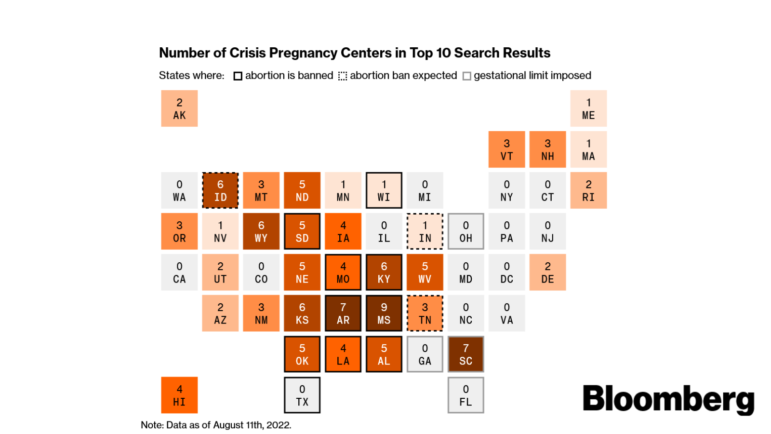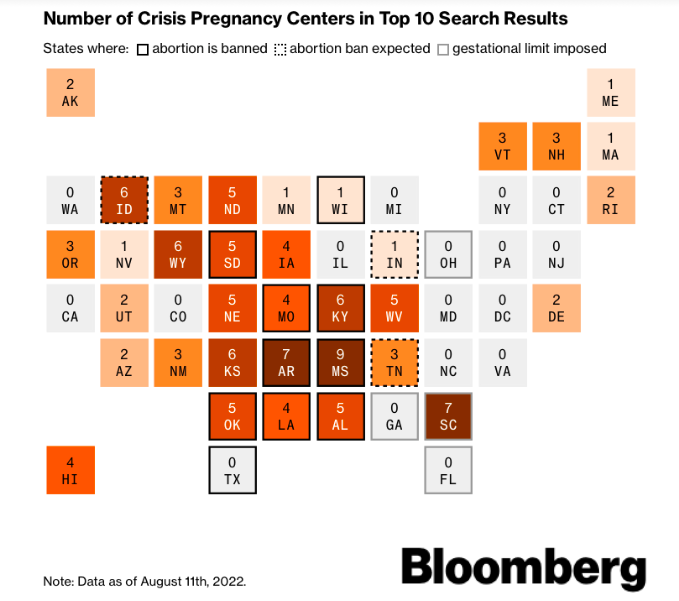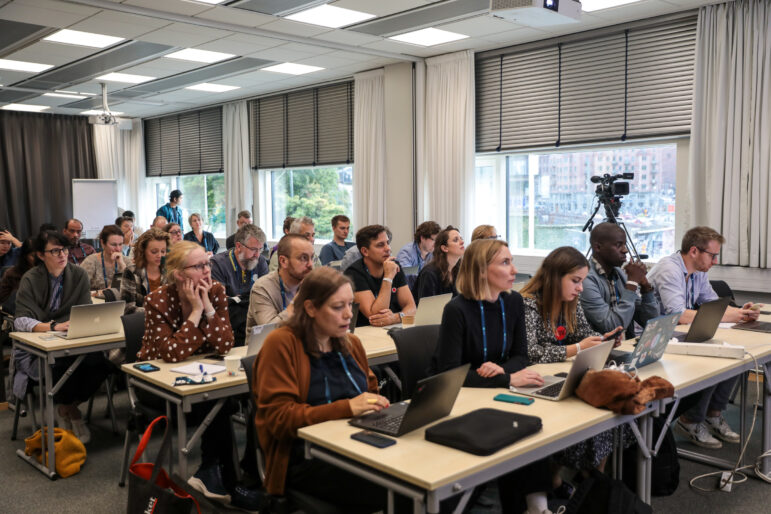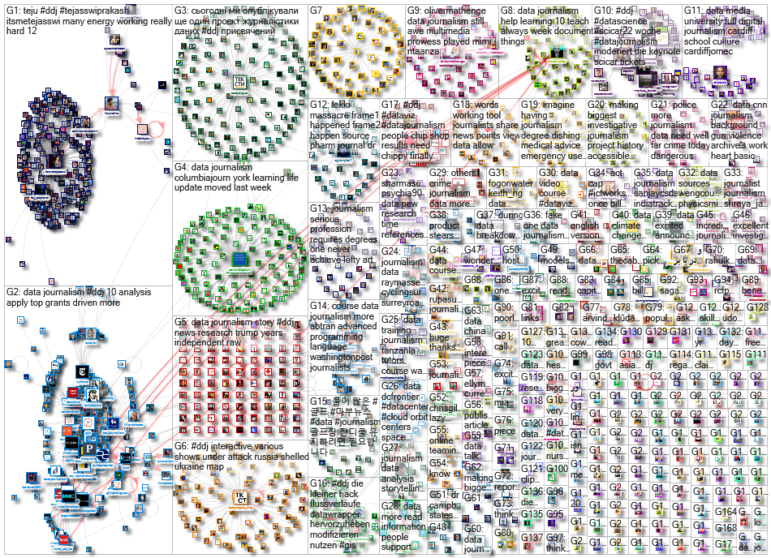

Data Journalism Top 10: Google and Abortion, Crisis in Emergency Care, Future Heatwaves, Marvel’s Cinematic Network
Read this article in

A Bloomberg investigation found that so-called Crisis Pregnancy Centers, which try to stop abortions, were commonly found in Google search results for those seeking the procedure. Image: Bloomberg
In a GIJN masterclass last month, open source reporting expert Henk van Ess warned that Google’s search algorithm has changed over time and often ignores, or substitutes, the precise terms searched. Our weekly NodeXL and human curation of the most popular data journalism stories on Twitter spotlights a Bloomberg investigation linked to this subject: journalists found that Google often directed users who search for abortion clinics in the United States to crisis pregnancy centers — organizations that are essentially anti-abortion. Also this week, we look at an investigation into the impact of state meddling in the finances of Canada’s Indigenous First Nations, data revealing a crisis in accident and emergency units in England, US heat wave predictions for the year 2053, and for film fans, a visualization of the Marvel Cinematic Universe.
Google Search Skews Abortion Results
If you’re searching for an abortion provider in the US using Google Maps, there’s a good chance that you will be directed to crisis pregnancy centers (CPCs) — organizations that typically try to dissuade pregnant women from getting abortions. According to an investigation by Bloomberg, typing “abortion clinic” into Google Maps’ search bar returned results that listed CPCs in about a quarter of the top 10 search results on average across all 50 US states. These results, along with inaccurate advertising by CPCs, are misleading women who are seeking abortions, reporters warned.
Canada: Mishandling Indigenous Funds
Between 2008 and 2016, the Canadian government had a policy that allowed the state to take complete control of a First Nation community’s finances if it believed there was cause to do so. An investigation by Canada’s National Observer and researchers at Toronto Metropolitan University revealed the long-term negative impacts of these takeovers, pointing to the failures of state-appointed third-party managers to improve water quality and the state of housing in the neighborhoods of First Nations, or Indigenous, people. Investigative journalist Patti Sonntag shared a behind-the-scenes look at the investigation.
Jailed for “Antisocial Behavior”
In England and Wales, people can be sent to prison for breaking “antisocial behavior” rules. This legal term can be broadly interpreted and has been used to jail a homeless man for begging on the streets, another for feeding pigeons from his balcony, and a third due to mental health issues. The government does not collect data on when and how these social behavior injunctions are issued or what happens when they are breached, so The Bureau of Investigative Journalism examined hundreds of court judgments between 2019 and mid-2022 to create a first-of-its-kind database. Their analysis of the data found the system to be severely flawed.
Salary Transparency
How much do government employees make in the city of San Francisco? And who is the highest paid? Surprisingly, it’s not the mayor. Using data provided by the city’s Controller Office, the San Francisco Chronicle created a comprehensive salary data interactive for readers to explore how much city workers were paid in 2020 and 2021. The story also revealed that employees in the understaffed fire, police, and sheriff departments racked up astonishing amounts of overtime pay, with those paychecks at times exceeding employees’ regular base wages.
Crisis in Emergency Care
England’s accident and emergency departments are in crisis. According to a report by The Sunday Times, more than 47,000 people who dialed 999 for help in July waited longer than four minutes for an answer — the slowest response on record. Once a patient is picked up, ambulance crews are also experiencing handover delays for severe patients due to overwhelmed hospitals, with some waiting up to three hours to drop off patients. All these delays result in elevated risks of “severe harm” to patients. The paper’s health editor Shaun Lintern summarized the issue in a tweet thread. Also relevant: The Financial Times examines the same problem.
Conserving the Future
On his first day in office, President Joe Biden had the US officially rejoin the Paris Agreement, a binding international treaty on limiting global warming that includes nearly 200 other countries. (Biden’s predecessor, Donald Trump, had pulled the US out of the accord.) National Geographic mapped regions across the US where scientists believe conservation efforts will help in the global goal of combating climate change. The maps highlight the most important places for preserving watersheds, wildlife, carbon sinks, and ecosystem diversity.
Predicting US Heat Waves in 2053
Countries around the world are experiencing extreme heat waves — record-breaking both in temperature and duration — and this trend is expected to worsen in the coming decades. The Washington Post analyzed data from First Street Foundation, a US nonprofit research and technology group, to map areas in the country that face “dangerous” heat levels by 2053. The data shows that an estimated 46% of Americans have endured at least three consecutive days of more than 100°F (37.7°C) heat, on average, each year. In the next three decades, that number is expected to increase to 63% of the population.
Assessing Brazil’s Politicians
GIJN member Repórter Brasil created an interactive tool that measures and evaluates the performance of Brazilian federal deputies on issues related to the environment, rural workers, and Indigenous issues. The tool uses two databases to score parliamentarians: their voting position on bills and measures that have socio-environmental impact, and legislative proposals presented by each individual. Each score is depicted using a human body temperature scale: the more negative-impact projects voted on or proposed by a deputy, the higher their temperature.
US Mass Killings Database
Mass shooting tragedies in the US capture the attention of the whole nation, but these gun-related incidents aren’t the only mass killings plaguing the nation. USA TODAY, Northeastern University, and the Associated Press have been tracking both public and private mass killings involving four or more victims since 2016. Their analysis broke down the numbers on the type of weapons used, gender and race of the killers, age of the victims, and more.
Visualizing the Marvel Cinematic Universe
Since the first Iron Man movie starring Robert Downey Jr. graced cinema screens back in 2008, the Marvel Cinematic Universe has grown to be a mega-blockbuster machine with a total of 29 movies made and more in the works. Freelance data visualizer Tristan Guillevin took a look at the franchise’s first phase of films released between 2008 and 2012. He visualized the expansion of the franchise’s universe, intersecting characters, and major plot points.
Thanks again to Marc Smith and Harald Meier of Connected Action for gathering the links and graphing them. The Top Ten #ddj list is curated weekly.
 Eunice Au is GIJN’s program manager. Previously, she was a Malaysia correspondent for Singapore’s The Straits Times, and a journalist at Malaysia’s New Straits Times. She has also written for The Sun, Malaysian Today, and Madam Chair.
Eunice Au is GIJN’s program manager. Previously, she was a Malaysia correspondent for Singapore’s The Straits Times, and a journalist at Malaysia’s New Straits Times. She has also written for The Sun, Malaysian Today, and Madam Chair.









